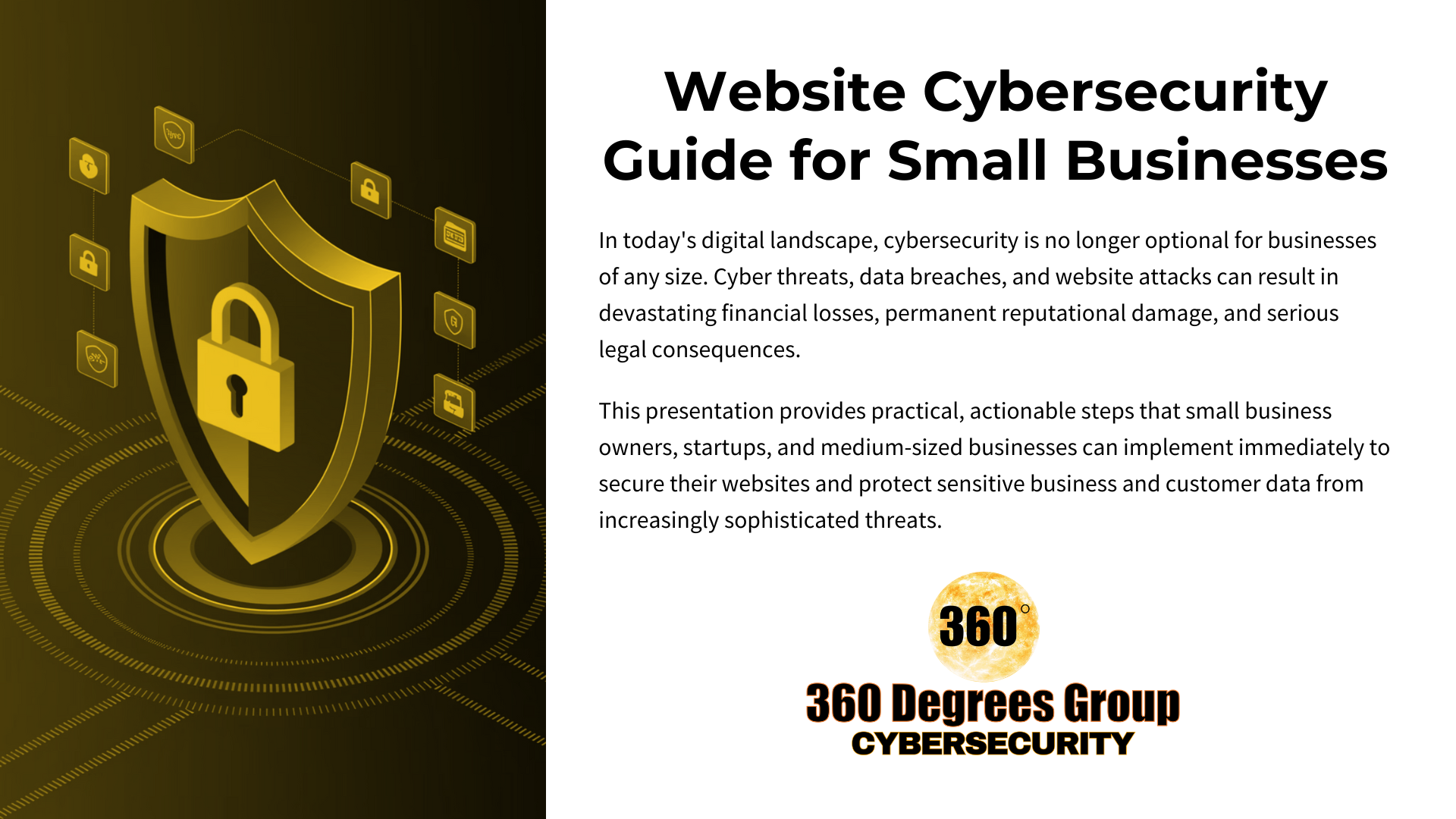
Introduction
In today’s digital-first economy, a business’s website is often its most valuable asset. Yet, it is also a prime target for cybercriminals. From data breaches and phishing attacks to ransomware and denial-of-service disruptions, the cyber threat landscape is constantly evolving. For small business owners, startups, and medium-sized enterprises, cybersecurity can no longer be an afterthought—it must be an essential part of your business strategy.
This guide by 360 Cyber Security Center provides practical, easy-to-implement website security solutions to help protect your company, customers, and critical digital assets.
1. Understanding Cyber Threats
Before deploying protective measures, you must understand the types of threats your business may face:
- Phishing Attacks – Deceptive emails or forms that trick users into revealing sensitive information.
- Malware & Ransomware – Malicious software that compromises or locks website functionality.
- DDoS Attacks – Flooding your server with requests to crash your website.
- SQL Injections – Inserting harmful SQL commands into forms or URL fields to access databases.
- Cross-Site Scripting (XSS) – Injecting scripts into your site to hijack user sessions or steal data.
2. Website Security Best Practices
a. Secure Hosting and Domain Management
- Partner with hosting providers offering 24/7 monitoring, DDoS protection, and security audits.
- Use domain privacy services to hide registration information.
- Consistently update CMS platforms, plugins, and themes.
b. Implement SSL Certificates
- Ensure your website uses HTTPS with a valid SSL/TLS certificate.
- Use advanced encryption (e.g., AES-256) for secure communications and transactions.
c. Strong Authentication and Access Controls
- Enforce strong, unique passwords (12+ characters).
- Activate Multi-Factor Authentication (MFA) for backend/admin logins.
- Limit access based on user roles and responsibilities.
d. Secure Website Code and Plugins
- Remove unused plugins and themes.
- Use trusted, actively maintained third-party tools.
- Perform regular code audits and vulnerability scans.
e. Backup and Recovery Plan
- Schedule automated daily backups and store them securely offsite.
- Test your disaster recovery plan periodically to ensure quick restoration.
f. Secure Payment and Customer Data
- Use PCI-compliant payment gateways (e.g., Stripe, PayPal).
- Tokenize sensitive customer data and enforce end-to-end encryption.
- Display a transparent privacy policy to build customer trust.
3. Preventing Cyber Attacks
a. Monitor and Detect Threats
- Install malware scanners and intrusion detection tools.
- Monitor server logs and file integrity.
- Set up automated alerts for suspicious activity.
b. Employee and User Training
- Educate your team on email safety, password hygiene, and phishing red flags.
- Require periodic cybersecurity training.
- Enforce a clean desk and secure device policy for remote work.
c. Protect Against DDoS Attacks
- Use Content Delivery Networks (CDNs) like Cloudflare or AWS Shield.
- Configure rate-limiting and request throttling.
d. Secure APIs and Third-Party Integrations
- Authenticate APIs using keys, OAuth, or tokenization.
- Conduct periodic API and plugin audits.
- Disable integrations that are no longer in use.
4. Compliance and Legal Considerations
- Stay updated on laws such as GDPR, CCPA, HIPAA, and PCI-DSS.
- Clearly communicate Terms of Service and Privacy Policies.
- Develop and maintain an Incident Response Plan (IRP).
5. Tools and Resources for Website Security
Category
Tools/Platforms
Security Plugins
- Wordfence, Sucuri, iThemes Security
Vulnerability Scanning
Qualys, OWASP ZAP, Nessus
Web Application Firewall
- Cloudflare, Sucuri WAF
Backup Solutions
- UpdraftPlus, Jetpack, CodeGuard
DDoS Protection
- Cloudflare, AWS Shield
Training Platforms
- KnowBe4, Cybrary
Conclusion
Cybersecurity is not a one-time investment—it’s an ongoing commitment. With the rise in cyber threats, small businesses and startups must take a proactive approach to website security. By following the guidance in this whitepaper and working with experts like the 360 Cyber Security Center, you can build a more secure, compliant, and resilient online presence.
About 360 Cyber Security Center
The 360 Cyber Security Center, a division of 360 Degrees Group Inc., is dedicated to delivering cybersecurity-as-a-service (CaaS) tailored to startups, small businesses, and mid-sized enterprises. From threat monitoring and penetration testing to compliance advisory and employee training, we provide full-spectrum protection to help your business thrive safely in a digital world.
Need Help Securing Your Website?
📞 Contact us today at security@360degreesgroup.com
🌐 Visit: https://360degreesgroup.com/cybersecurity/
🔐 Secure Your Business. Empower Your Growth.
